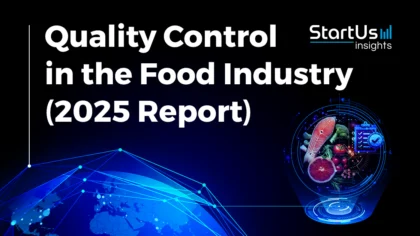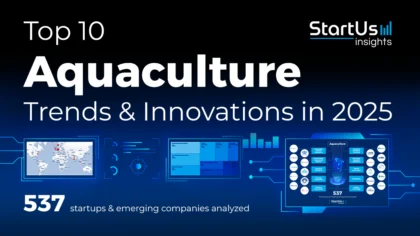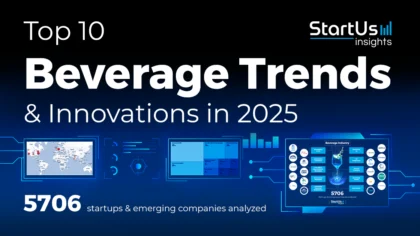Accelerate Productivity in 2025
Reignite Growth Despite the Global Slowdown
This report on quality control in the food industry details current trends, key players, and emerging developments in food quality management. Technologies such as artificial intelligence (AI), blockchain, and the internet of things (IoT) enhance quality control processes to enable real-time monitoring, predictive analytics, and transparent supply chain management. As the demand for higher standards in food safety grows, the integration of tech-driven solutions becomes essential to maintain consistency, reduce waste, and meet evolving regulatory requirements.
This food quality market report serves as a reference for stakeholders within the industry, investors, policymakers, and economic analysts, providing a snapshot of the industry’s health to map its trajectory for innovation and growth in the coming years.
StartUs Insights Quality Control in the Food Industry (2025 Report)
- Executive Summary
- Introduction to the Food Quality Report 2025
- What data is used in this Food Quality Report?
- Snapshot of the Global Food Quality Industry
- Funding Landscape in the Food Quality Industry
- Who is Investing in Food Quality Solutions?
- Emerging Trends in the Food Quality Industry
- 5 Innovative Food Quality Startups

Executive Summary: Quality Control in the Food Industry (2025 Report)
This report is created using data obtained from the Big Data and AI-powered StartUs Insights Discovery Platform, covering more than 4.7 million global companies, as well as 20K+ technologies and emerging trends. We also analyzed a sample of 1290+ food quality startups developing innovative solutions to present five examples from emerging food quality industry trends.
- Industry Growth Overview: The industry shows an annual growth rate of 8.14%. It includes over 27K companies, with about 1296 startups.
- Manpower & Employment Growth: Global manpower stands at over 137K employees, adding over 6K new jobs in the last year.
- Patents & Grants: Over 460 applicants filed 490+ patents. Moreover, the industry experienced 1.46% yearly patent growth, with China and the USA leading in patent issuance. Additionally, the sector secured 140+ grants.
- Global Footprint: The industry highlights key hubs in the USA, India, UK, Spain, and Canada. Major cities cover Bangalore, Singapore, London, Pune, and New York City.
- Investment Landscape: The average investment value stands at USD 27 million per round. It attracted 500+ investors with 2K+ funding rounds and investments in over 700 companies.
- Top Investors: A few of the top investors include OTP Bank Romania, Axilor Ventures, NYSERDA. Such top investors collectively invested over USD 7 million.
- Startup Ecosystem: Five innovative startups in the sector include CanDry (Dehydration Technology), Axino (Automatic Temperature Monitoring), Sensip-dx (Bacteria Detection), Qualityc (Fruit Quality Inspection), and Innovai (Seafood Shelf Quality Improvement).
- Recommendations for Stakeholders: Investors are already looking for AI-powered quality control systems and IoT sensors to enable real-time monitoring and detection of defects throughout the production process. Integrating technologies such as blockchain for transparent supply chain management and automation for fast and accurate quality assessments will streamline operations and ensure compliance with food safety regulators. Governments also have a role to play in meeting innovation with suitable policies and preventing adverse impacts on food producers.
Explore the Data-driven Food Quality Management Report for 2025
The Food Quality Report 2025 uses data from the Discovery Platform and encapsulates the key metrics that underline the sector’s dynamic growth and innovation. Our database comprises over 27000 companies, including 1296 startups, showcasing the business landscape. The industry experienced growth, with an 8.14% increase in the last year.
A key indicator of this innovative drive is the 490+ patents filed. Additionally, 140+ grants have been awarded for enhancing research and development efforts across the industry.
The global manpower within these companies stands at 137000+ employees. Moreover, there has been an increase in employment, with over 6000 new jobs created in the last year.
The top country hubs driving this growth include the USA, India, the UK, Spain, and Canada leading the way. Within these countries, the cities of Bangalore, Singapore, London, Pune, and New York City emerge as key metropolitan hubs for innovation and business development.
What data is used to create this food quality market report?
Based on the data provided by our Discovery Platform, we observe that the food quality industry ranks among the top 5% in the following categories relative to all 20K topics in our database. These categories provide a comprehensive overview of the industry’s key metrics and inform the short-term future direction of the industry.
- News Coverage & Publications: Over 7K news articles were published about the food quality industry.
- Funding Rounds: Our database includes data on more than 2000 funding rounds, highlighting the investment activity within the industry.
- Manpower: The industry showcases a workforce of over 137K employees, with an addition of over 6K new employees in the last year.
- Patents: More than 490 patents were filed to advance technology and intellectual property.
- Grants: The industry also secured over 140 grants to reflect the support for research and development initiatives.
- Yearly Global Search Growth: It stands at 12.37%.
A Snapshot of the Global Food Quality Industry
The food quality industry demonstrated expansion with an annual growth rate of 8.14% and the presence of 1296 startups. Within this startup ecosystem, over 340 are in the early stages, indicating a pipeline of emerging companies with potential for impact and innovation. Additionally, more than 90 companies reached the merger and acquisition (M&A) stage, showcasing the industry’s maturity and consolidation trends.
Innovation stands strong with the issuance of over 490 patents. This patent activity is driven by 460+ applicants, highlighting the engagement in research and development. The industry experienced a yearly patent growth of 1.46%, which reflects ongoing advancement and technological progress. China and the USA lead the way in patent issuance, with China accounting for over 230 patents and the USA contributing more than 90.
Explore the Funding Landscape of the Food Quality Industry
Investment activity in the food quality industry is highlighted with an average investment value of USD 27 million per round. This funding reflects investor confidence and a commitment to supporting industry growth. The sector attracted over 500 investors, resulting in the closure of more than 2000 funding rounds. This influx of capital has been distributed among over 700 companies, underscoring the investment and industry’s potential.
Who is Investing in Food Quality Solutions?
The combined investment value by the top investors in the food quality industry exceeds USD 7 million. Here are the key investors and their contributions:
- Scottish EDGE invested USD 120K in at least 1 company.
- Axilor Ventures funded USD 1 million in at least 1 company.
- NYSERDA financed USD 1 million in at least 1 company.
- OTP Bank Romania backed USD 5 million in at least 1 company.
- AgFunder sponsored USD 100K in at least 1 company.
Access Top Food Quality Innovations & Trends with the Discovery Platform
Organic Farming includes about 2K companies with 137K employees contributing to its growth. Despite the addition of 8K new employees last year, the sector reflects a –10.66% annual trend growth rate.
Temperature Monitoring is identified in 1K companies employing 35K workers. Despite the industry ensuring safe storage and transport of perishable goods, the sector experienced a slight decline, with a -1.08% annual trend growth rate. However, 2K new employees were hired last year.
The Preservatives trend in food production grows with 5K companies employing 284K individuals. It hired about 18K new people in the last year and showed an annual trend growth rate of 15.49%.
5 Top Examples from 1290+ Innovative Food Quality Startups
The five innovative startups showcased below are picked based on data including the trend they operate within and their relevance, founding year, funding status, and more. Book a demo to find promising startups, emerging trends, or industry data specific to your company’s needs and objectives.
CanDry develops Dehydration Technology
Canadian startup CanDry develops CanDry technology, a low-temperature drying technology to preserve nutrients, flavors, and pigments during the drying process. This technology uses microwave and vacuum techniques to evaporate moisture gently and uniformly. This ensures minimal nutritional loss and superior product quality. Its customizable settings allow for precise control, reduce operational costs, and improve efficiency for applications including agri-food processing, medical, and cosmetic industries.
Axino offers Automatic Temperature Monitoring
Swiss startup Axino provides an IoT-based automatic temperature monitoring solution that ensures real-time control over core product temperatures. It uses sensors to collect core temperature data from cooling devices to transmit the information via a gateway to the cloud for monitoring. This solution eliminates manual checks while maintaining food safety and compliance with legal regulations. Its features include automatic notifications for temperature fluctuations and energy-saving settings to reduce food waste, electricity consumption, and operational costs.
Sensip-dx detects Bacteria
Dutch startup Sensip-dx develops bacteria detection technology that distinguishes living and dead bacteria in food processing environments. The startup’s system uses imprinted polymers coated on metal disks to detect bacterial binding through thermal measurements, toxins, and antibiotic residues. This technology operates next to food production processes for earlier and more frequent contamination checks to enhance operational efficiency.
Qualityc inspects Fruit Quality
Spanish startup Qualityc utilizes AI and near-infrared (NIR) technology to inspect fruit quality on production lines. Its system analyzes both external factors such as coloration, mold, and diseases, and internal properties like pH, sugar content, and maturity. Further, it provides real-time data and images for monitoring and optimizing fruit quality throughout the production process. With production-ready machines integrated into existing operations, Qualityc offers an automated solution that enhances quality control, reduces waste, and maximizes efficiency.
Innovai improves Seafood Shelf Quality
Chile-based startup Innovai offers a technological solution that extends the shelf life of fresh seafood using its proprietary FishExtend technology. It involves applying a spray of natural ingredients directly onto fresh salmon and other seafood during processing to delay the growth of microorganisms while maintaining the fish’s color, texture, and flavor. The technology allows transportation of the products over longer distances without spoilage to reduce seafood waste and logistical costs.
Gain Comprehensive Insights into Food Quality Trends, Startups, or Technologies
The food quality industry leverages technologies such as blockchain for traceability, AI for predictive analytics, and IoT for real-time monitoring. The dedication of key industry players to innovation and rigorous quality control measures strengthens consumer trust and supports regulatory compliance. Get in touch to explore all 1290+ startups and scaleups, as well as all industry trends impacting food quality companies.








